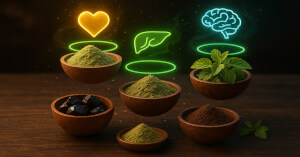
Amla
Amla, or Indian gooseberry, is rich in vitamin C and supports immune function, skin health, and digestion.
Amla (Phyllanthus emblica), also known as Indian gooseberry, is a sour green fruit widely used in Ayurvedic medicine for its rejuvenating and antioxidant properties. It is one of the key ingredients in the traditional formula Triphala.
Amla is exceptionally rich in vitamin C and contains tannins, polyphenols, and flavonoids that may help combat oxidative stress, support immunity, and promote healthy skin and digestion. It is consumed fresh, dried, or as a supplement.
People use Amla to support immune health, skin vitality, and metabolic balance. While traditional use is extensive and promising, more robust scientific research is needed to confirm its full range of health effects.
Other names & forms of Amla supplement : emblica officinalis, indian gooseberry, amalaki, amla extract, amla fruit
Possible Benefits
From daily wellness to targeted support, Amla offers a variety of potential health benefits:
- Immunity: Amla is traditionally taken to strengthen the immune system and fight oxidative stress, thanks to its high vitamin C content.
- Anti-Aging: Its antioxidant properties help combat cellular damage, supporting healthy aging and vitality.
- Digestive Health: Amla may promote healthy digestion and detoxification, particularly when taken as part of traditional formulas.
- Heart Health: Some evidence suggests it may support cardiovascular function and cholesterol balance.
Side Effects
Amla delivers potent antioxidant support, but occasional side effects can emerge as you boost vitamin C intake. Watch out for:
- Gastrointestinal discomfort, bloating or mild diarrhea, due to high fiber and vitamin C
- Acid reflux or heartburn if taken on an empty stomach
- Headaches or mild dizziness in sensitive individuals at higher doses
- Possible mouth or throat irritation when using concentrated powder
- Rare allergic reactions, itching or rash, in those with fruit sensitivities
Interactions
Potential interactions include:
- Antidiabetic drugs: Amla’s high vitamin C and fiber content may enhance metformin or insulin effects, increasing hypoglycemia risk, monitor levels.
- Anticoagulant and antiplatelet agents: Amla’s tannins can add to warfarin or supplements such as Garlic, heightening bleeding potential.
- Iron supplements: Vitamin C in Amla boosts iron absorption; when combined with Iron, it may lead to gastrointestinal upset, take with food.
- Thyroid medications: Amla may alter thyroid hormone metabolism; if on levothyroxine, check thyroid panels periodically.
Precautions
Before you begin Amla, confirm whether the following apply to you. If they do, seek professional guidance:
- Pregnant or breastfeeding women: Generally safe in moderate food amounts; high-dose supplements should be discussed with a healthcare provider
- Individuals with acid reflux or ulcers: May exacerbate symptoms; consider lower doses or food-based sources
- People on blood-thinning medications: May have mild antiplatelet effects; monitor clotting parameters
- Those with kidney stones history: High vitamin C intake can increase oxalate levels; use caution
- Patients with diabetes: Can influence blood sugar control; monitor glucose closely
Studies
These studies provide scientific insights into Amla benefits:
A 2023 systematic review and meta-analysis of randomized controlled trials found that Emblica officinalis supplementation significantly lowered LDL-C , triglycerides and high-sensitivity CRP compared to placebo, indicating cardiometabolic benefit.
A 2024 randomized, triple-blind add-on trial in 150 patients with essential hypertension showed that 500 mg Emblica officinalis twice daily failed to produce any additional reduction in systolic or diastolic blood pressure, lipid profile, HbA1c, arterial stiffness, or inflammatory markers versus placebo.
A 2014 double-blind crossover study in 12 healthy volunteers demonstrated that 250 mg Phyllanthus emblica extract twice daily for 14 days significantly attenuated cold-pressor-induced increases in augmentation index and aortic blood pressure and increased subendocardial viability ratio versus placebo, suggesting improved vascular function.
A randomized, double-blind RCT in 59 metabolic-syndrome patients reported that 500 mg twice daily of standardized Emblica officinalis extract for 12 weeks significantly improved endothelial function and reduced hs-CRP levels compared to placebo, supporting its anti-inflammatory effects.
Disclaimer: This page is for educational purposes and does not replace medical advice. If you're pregnant, have a condition, or take medication, speak with a qualified professional.
Related Articles








